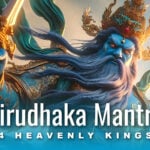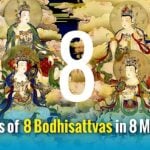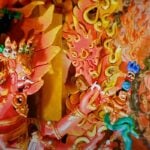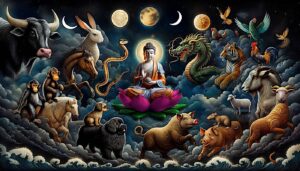Taking Refuge in Buddha, Dharma and Sangha and the Four Immeasurables sung by amazing Yoko Dharma with video visualizations
At the heart of Buddhist practice is “Taking Refuge in the Buddha, the Dharma and the Sangha” — the Three Jewels.
More than anything else, Refuge distinguishes our meditation as “Buddhist.” The main refuge from fear, from anger, from the Three Poisons, is the Three Jewels. We can speak of many meditations to overcome the obstacles to realizations and Enlightenment, but the most important first step is Refuge in the Three Gems.
What distinguishes Mahayana Practice is Bodhichitta, exemplified in the Four Immeasurables.
All Mahayana and Vajrayana Buddhist practices begin with Refuge. Chant along with the magnificent voice of Yoko Dharma as she sings the refuge in Tibetan (words prompted on screen with English translation) — including the Bodhisattva aspiration. Then, enhance the Mahayana perfection by chanting the Four Immeasurables — wishing immeasurable happiness to all sentient beings in the Universe, with a second chant.
Play here [lyrics in the video — and also below video in this feature]:
Lyrics to The Refuge in the Three Jewels
Sanggye Choedang Tshogkyi Chognam La
English: I take refuge in the Buddha, the Dharma and the Supreme Sangha
Jangchub Bardu Dagni Kyabsu Chi
English: Until I attain Enlightenment
Daggi Jinsog Gyipei Soenam Kyi
English: By the merit I accumulate from practising generosity and other perfections
Drola Phenchir Sanggye Drubpar Shog
English: May I attain Enlightenment in order to benefit all living beings
Related Features:
- The Dalai Lama and eight other teachers explain how to avoid taking Refuge in the wrong things and why Refuge can help us overcome obstacles
- Padmasambhava: The Eight Great Qualities of Taking Refuge; Taking Refuge in the Three Precious Jewels, the Defining Practice of Buddhism, and How it Can Rescue Us From All Dangers.
- The Profound Practice of Taking Refuge
The Four Immeasurables (with Namo Buddhaya, Namo Dharmaya, Namo Sanghaya)
Namo Guru be
English: I prostrate to the Guru (teacher)
May all beings have happiness and its causes
Namo Buddha ya
English: I prostrate to the Buddha
May all beings be freed from suffering and all its causes
Namo Dharma ya
English: I prostrate to the Dharma (the teachings)
May all beings constantly dwell in joy transcending sorrow
Namo Sangha ya
English: I prostrate to the sangha (community of Dharma practitioners)
May all beings dwell in equal love for those both close and distant.
Yoko Dharma’s brilliant vocalization of Refuge in “Om Mani Padme Hum” is used with her kind permission. Information on Yoko Dharma (or to download the track) please visit here>>
About Yoko Dharma
From her website:
More articles by this author

Video: Amitabha Buddha Mantra Om Ami Dewa Hri — bring infinite light and love into your life: powerfully chanted by Yoko Dharma with animated visualizations

Video: chanting Green Tara by Yoko Dharma; from our guided meditation series, Green Tara images and mantra to empower your practice

Video mantra chanting: Lama Tsongkhapa’s Migtsema wonderfully chanted by Yoko Dharma. Benefits: healing, compassion, metta, wisdom
Search
Latest Features
Please support the "Spread the Dharma" mission as one of our heroic Dharma Supporting Members, or with a one-time donation.
Please Help Support the “Spread the Dharma” Mission!

Be a part of the noble mission as a supporting member or a patron, or a volunteer contributor of content.
The power of Dharma to help sentient beings, in part, lies in ensuring access to Buddha’s precious Dharma — the mission of Buddha Weekly. We can’t do it without you!
A non-profit association since 2007, Buddha Weekly published many feature articles, videos, and, podcasts. Please consider supporting the mission to preserve and “Spread the Dharma." Your support as either a patron or a supporting member helps defray the high costs of producing quality Dharma content. Thank you! Learn more here, or become one of our super karma heroes on Patreon.
Yoko Dharma
Author | Buddha Weekly
I sing to create awareness and positive global change. Invoking healing, peace and transformation through the power of music, my intention and my lyrics.
As I grow and cultivate these things in my own life, my motivation is to inspire others to do so as well. If we can realize the true wisdom and compassion that is deep within us and if we genuinely come from a place of caring and compassion when relating to other people, I believe we can truly change the whole world.
















